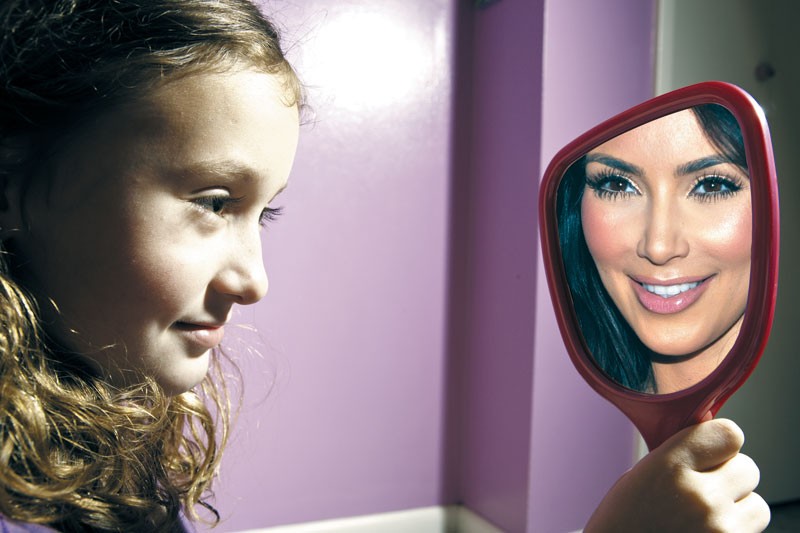When children across the world saw what happened to Veruca Salt on Willy Wonka and the Chocolate Factory, we felt vindicated. Any child villainous enough to demand a goose that lays a golden egg should be dumped down a chute!
But that was 1971.
Veruca Salt’s behavior no longer has shock value. Have you watched an episode of My Super Sweet Sixteen? (Or anything involving the Kardashians?)
Empty Praise
In The Narcissism Epidemic, authors Jean Twenge and Keith Campbell examine a meteoric rise of self-obsessed young Americans: Born in the early 1980s and later, our current generation of adults, referred to as Generation Y or Millennials, is beyond confident: They’re entitled.
“Self-esteem is at an all time high,” they report. “More than 80 percent of recent college students scored higher in general self-esteem” than their peers in the 1960s.
Back in 1982, when Twenge gave 16,000 students a “Narcissistic Personality Inventory,” only a third scored above average. Today more than 65 percent do.
The instant gratification of hand-held technology, reality TV and YouTube are contributing causes, they say, but so are those “I Am Special” preschool songs.
“In the past few decades,” write Campbell and Twenge, “American parenting has moved to a different model. Heaping on praise for the littlest achievement, and even sometimes for poor performance, is a great recipe for narcissism.”
When David McCullough Jr. told the graduating class at Wellesley High in Massachusetts in June that “You’re not special,” he created a sensation for putting his finger right on the issue.
Steven Heaps worked as a child psychologist in Spokane from 1976 until 2004. He says in that time he did notice “a certain number of parents” shift their focus toward praising and away from discipline.
“They thought if students have high self-esteem, they’ll be fine. They didn’t want to disappoint or anger their kids, or deal with tantrums, so they gave them whatever they wanted,” says Heaps.
“But you can’t learn responsibility, skills… or a good work ethic if you get privileges no matter what,” he says.
Something for Nothing
There’s a psychological term for this kind of treatment: “non-differential reinforcement.” In this dynamic, “You get the prize even though you don’t play. But if you reinforce children regardless of what they do, then they don’t have to do anything,” says Heaps.
“Reinforcements” range from seemingly innocuous comments like “Good job, buddy,” or “You’re so smart!” to immediately replacing mobile phones when they’re lost or broken.
Differential reinforcement (doing something to get something) is more effective, says Heaps.
“If you eat your vegetables, you get dessert. If you mow the lawn, you get money,” he explains. “When [children] do hard work or are polite to other people or are fair, they should be rewarded. If they are trained to just expect everything, that’s when they turn into narcissists.”
The other side of differential reinforcement is letting kids deal with screw-ups.
“One of the things parents have to do is allow their children to fail,” explains Marcie Norstadt, an elementary school teacher in north Spokane for 28 years.
“It’s hard … but if a child doesn’t bring in homework, don’t go back home and get it for them,” she stresses. “You have to let them fall down. You have to let them fail, or they will not learn” consequences, responsibility or respect.
Campbell and Twenge, not surprisingly, are huge fans of letting kids fail, both academically and athletically.
“Instead of telling kids what winners they are, it’s better that they learn how to fail with grace and resilience, ” they write.
“Y” There’s Hope
Once considered a serious social and mental condition by the DSM (Diagnostic and Statistical Manual of Mental Disorders), it’s a little jarring to hear Campbell and Twenge casually describe so many of our own children’s personality traits as “narcissistic.” Keep in mind this particular “n” word is now a synonym for “conceited,” “egotistical” and “vain.”
While they are more self-focused than any other generation in history (Twenge also refers to them as “Generation Me”), adults 18-29 are also euphemistically described as “optimistic.”
A 2010 Pew Research of “Millenials” uncovered that of the 33 percent who actually have jobs, only 31 percent of them make “enough money to lead the kind of life they want,” yet 92 percent believe ”they will in the future.”
More quick facts: Millenials are more tolerant of different races and sexual preferences. And compared to Generation Xers, half as many of them are married; less than 25 percent are married with kids. Naturally, more of them are in college, volunteer, go out, exercise and… What? They even watch less TV!?
In spite of Twenge and Campbell’s assertion that reality TV and celebrity obsession are a large influence on their warped self-images, only 1 percent of Millenials say they strive to “be famous,” and only about a quarter of them have voted on American Idol.
Retraining Parents
Twenge and Campbell describe narcissism as “the fast food of the soul. It tastes great in the short term, has negative, even dire consequences in the long run, and yet continues to have widespread appeal,” they write.
Not shockingly, for a generation raised on self-esteem curriculum and Happy Meals, childhood obesity and narcissism are rising at the same rate.
Accordingly, moderation and exercise are keys to combating both.
“Instead of saying, ‘You’re So Smart,’ say ‘You really did well on those math problems,’” they suggest. Or, instead of “’You’re an awesome swimmer — you’re the best!’ say “Keep practicing your flip turns. Think about starting a little close to the wall.’”
Heaps says adding consequences to specific feedback is another step in reversing our current methods.
“I don’t think you have control over anything if the kid doesn’t have consequences,” says Heaps. “Start with rewarding a few small behaviors,” like giving specific praise for putting away three toys. “Gradually require more effort by the child, that’s the way to build persistence,” he says.
The next step is building empathy.
“We have an opportunity to raise adults,” says Spokane mom Zibby Merritt. “[Children] need to be told when they do things well, and they know when they haven’t. We need to stop being condescending.”
And as self-focused as our young population is, Merritt says she believes they can still be taught how their words and actions affect others.
“Most grown-ups are really into being good parents, so if there is a movement” for creating empathy in our kids and allowing them to fail, “people will want to do the new right thing.”




















